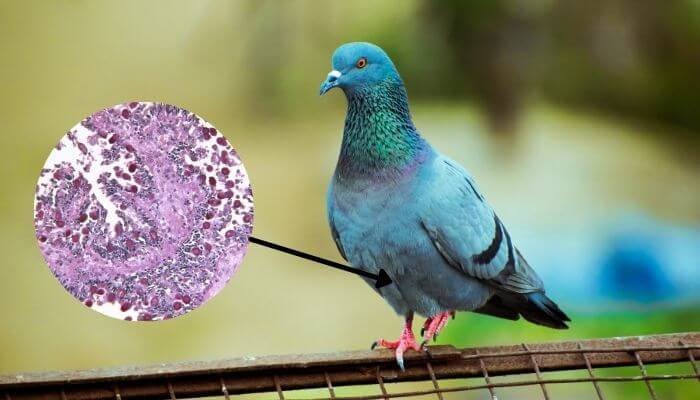Coccidiosis is a fairly common illness in pigeons.
It affects the intestines.
It is present in most pigeons, but they’ve adapted and have developed an immunity to it.

That means that even if they carry it, they are still considered healthy.
If you breed pigeons or keep them as pets, it pays to be able to recognize the disease so you can have it treated if necessary.
This guide will tell you everything you need to know.
What is Coccidiosis?
Coccidiosis is a parasitic infection that is most often seen in younger pigeons. It’s not as common in adult pigeons.
It’s passed through pigeon faeces and can also be passed on through shared food and water sources.
Stress may also play a role in the development of the disease, particularly in younger pigeons.
The parasites are most often found in the intestines but have also been located in the kidneys, liver and other organs of pigeons.
There are two forms of coccidiosis:
- Coccidiosis
- Coccidiasis – the most common form in the avian world.
Unlike coccidiosis, coccidiasis has no visible symptoms and is usually not diagnosed until a post mortem has been performed upon a deceased bird.
For this reason, we will focus on coccidiosis.
Symptoms of Coccidiosis
If you breed pigeons or keep them as pets, it’s a good idea to be able to recognize symptoms a pigeon might be sick. For that reason, you should know what the symptoms of coccidiosis are. That way if you notice them, you’ll know that your pigeon probably needs medical care.
Symptoms to be on the lookout for include:
- Severe diarrhoea, which may be green or bloody and contain mucus identifying as being different to usual white pigeon poop.
- Depression
- Droopiness
- Lameness
- Reduced egg production
- Loss of appetite
- Weight loss
- Pale skin
- Dehydration
- Ruffled feathers
- Convulsions
- Inactivity.
This is quite a range of symptoms and in various combinations could be indications of another problem.
Without proper treatment, coccidiosis can lead to death, especially among young pigeons. That makes it vital to seek treatment as soon as you suspect that your bird may be sick.
How Coccidiosis is Diagnosed
Because coccidiosis is fairly common among pigeons, it’s important to be able to identify it, but also know when treatment is necessary. If you notice any of the symptoms of the illness in your pigeons, a call to the veterinarian is the best idea.
The vet will perform a test to identify the presence of oocysts in the sick bird. The vet will examine faecal matter or scrapings from the intestinal tract under a microscope. A PCR (polymerase chain reaction) test may also be required to enable the vet to identify the species of coccidia.
A vet may also spot lesions in the intestinal tract which is an indication of the disease.
How to Treat Coccidiosis
Treatment is available and can help restore your pigeon’s health. The goal with treatment is to kill the parasites and prevent the spread of the illness among the rest of your flock.
Drug administration is the most common form of treatment and there are several options. They include anticoccidial medications that stop the growth of the parasite. Thiamine antagonists such as amprolium are effective because the parasites need vitamin B1 to grow. Other options include arsenic and folic acid antagonists.
Your veterinarian or local pigeon rescue centre will help you decide which option is best for your pigeon’s needs. Depending on the advice, the required drugs might need to be prescribed, otherwise, there are proprietary over-the-counter medicines available from pet stores and Amazon.
The bird may develop an immunity to the medication so it is important to stay in contact with the vet who may change the drug if long term treatment is required.
An otherwise healthy bird on average will recover from coccidiosis after being medicated for two weeks.

This article was written by our qualified veterinarian Cristina.
This is part of our commitment to providing you with the most trustworthy veterinary advice for your pigeons.
How to Prevent Coccidiosis
One of the best ways to prevent coccidiosis in pigeons is to keep their living environment clean and dry at all times. This is also a good way to prevent other illnesses and gives your pigeon a safe and comfortable place to live.
If any of your birds have been diagnosed, a total scrub down of the loft with extremely hot water and disinfectant will go some way to removing any lingering parasites, reducing the risk of contamination for your healthy birds.
Preventative medication is also a good idea. This easy step provides protection against coccidiosis, as well as other parasitic illnesses that can make your pigeon sick or even lead to death. Medication can be added to feed for young pigeons for their first 8-10 weeks of life to prevent early infection (the period during which the disease is most deadly).
You should also clean and disinfect food and water bowls at least once per week or anytime there is faeces in any of your bird feeders or bowls. If you are introducing new pigeons to your flock, it’s best to isolate them before allowing them to mingle with the others. This cuts down on the risk of spreading the infection, should the newcomer have coccidiosis.
Keeping your pigeons’ healthy means knowing when they might be sick and when they need to see a vet. While coccidiosis is a common ailment in birds, it can lead to death so it’s vital to get it treated as soon as possible.
Sources:
